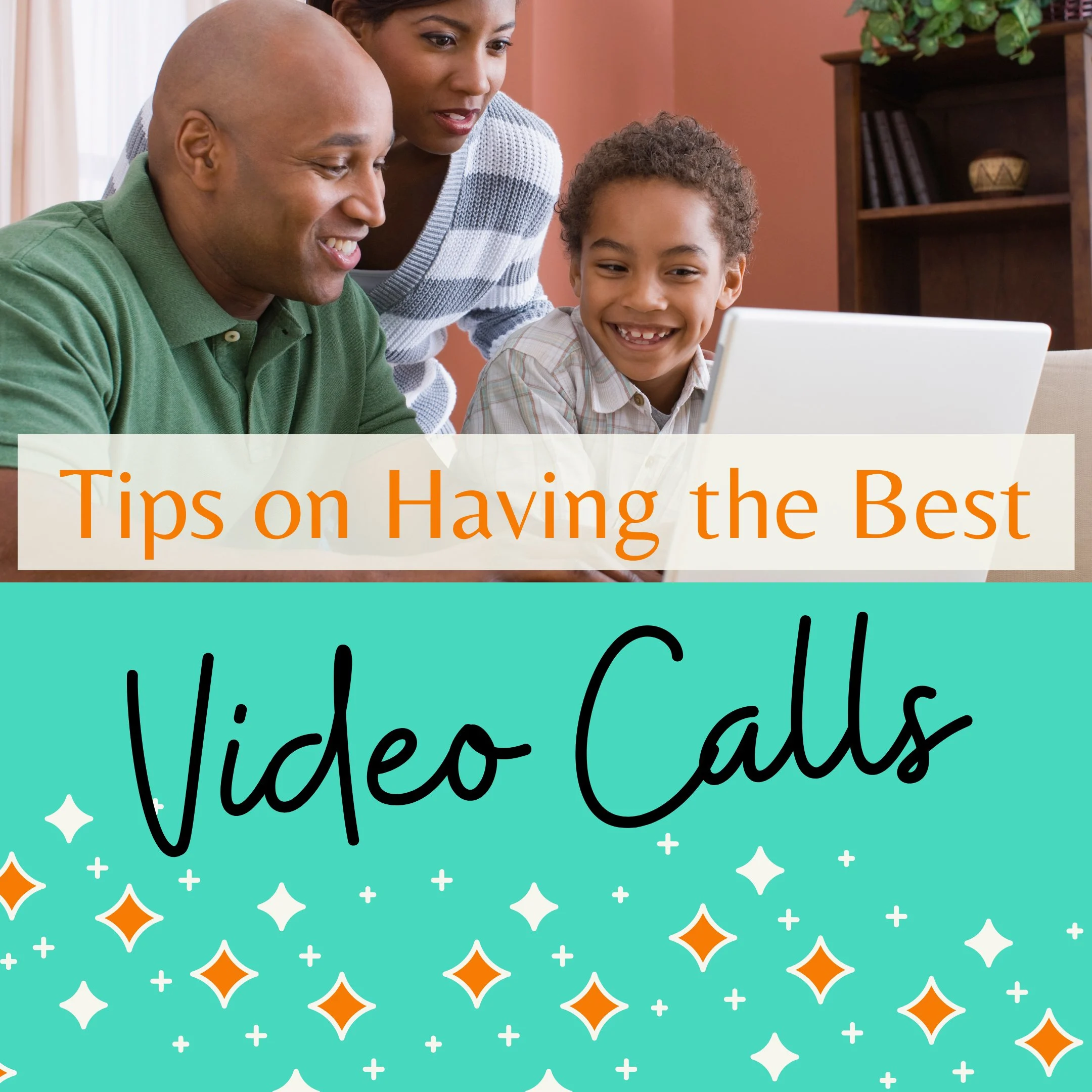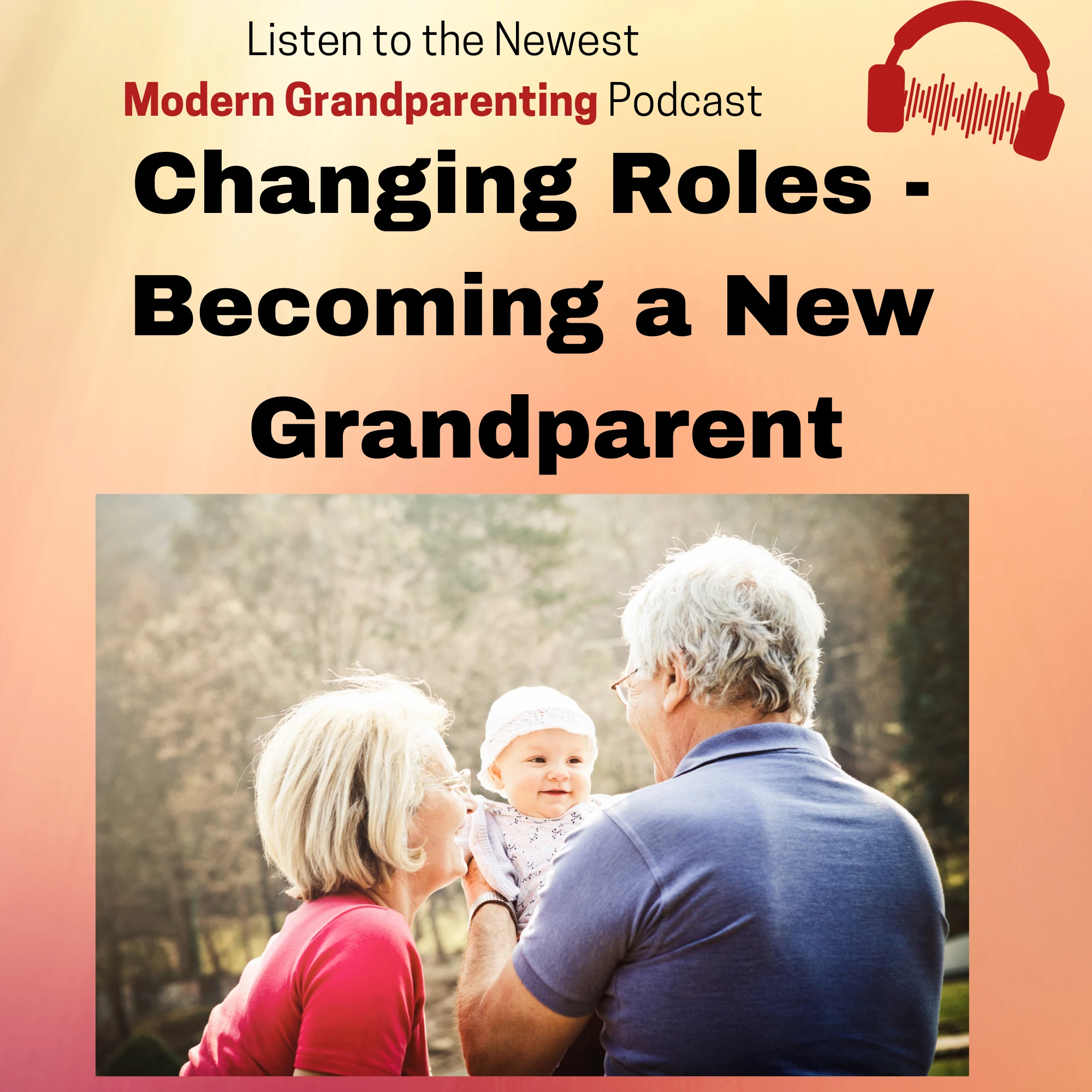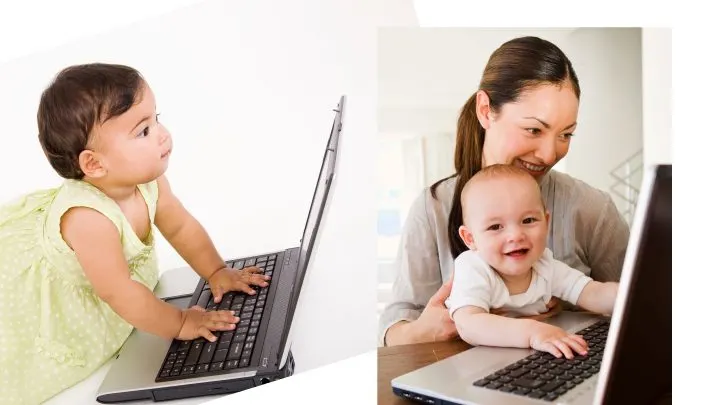In this episode of Modern Grandparenting, it’s all about defining the rules and boundaries for grandparents. No one wants to fight with their children, especially when they hold the key to seeing your grandkids, so what should you and should you not do?
Another way to listen is to subscribe to one of these services:
Apple Podcasts
Spotify
Google Podcasts
Deezer
Disclaimer: Some of our articles may contain affiliate links; when you click on these you can purchase a product or service at no extra cost to you, but doing so provides us some income to run the blog, and we thank you.
Show Notes
0:39 – The Three Non-negotiables!
2:02 – Biggest complaints that grandmas and grandpas have
3:16 – Parent resentful of what grandparents might say
4:23 – The hard questions
8:54 – Being mindful of what you say and do
11:24 – You know your child- watch for warning signs
12:08 – Listen while your children talk about others parenting for a clue.
14:00 – In your wisdom – give your children the same benefits that you had.
16:27 – A little about baby weaning
17:42 – A little about sleep
19:03 – Bedtimes
20:59 – A little about disciplining a child
26:19 – Routines are critical
27:15 – A few other rules
28:00 – Social Media, screen time, and sweets
33:46 – Comparing parents to their children
35:08 – Enjoy your role as a grandparent – step back.
Community
We’d love for you to follow our website by signing up for the newsletter as well as our private facebook group (Grannies go Digital) where we really love discussing the issues that we talk about on the podcast. Feel free to start a question and have our wonderful members give you advice, and you can do the same for them. We are all learning together.

If you enjoyed Setting Boundaries...
Transcript
Corinne 0:03
Welcome to our weekly podcast modern grandparent team, where we’d like to discuss issues that grandparents deal with in this changing world, for maintaining the best relationships with both our children and our grandchildren, to give you all kinds of ideas of what to do all year long, and hopefully making lots of lasting memories to last lifetime. In this episode, we talk about grandparent boundaries and rules. It’s an important topic and one that we’ve already mentioned a little bit. But why do we think it’s important because we like keeping the peace with our children, the parents of our grandchildren, so that we get to see them as much as possible.
Jim 0:38
And as we mentioned, in our changing roles podcast, we think there’s at least three non negotiable things to do when becoming a new grandparent. Number one, the most important rule is that you’re someone who should unconditionally love the child, that your grandchild is the most important thing for you. Right? Right. You are there for hugs, kisses, playing with men, being friends, being a friend, being a mentor, another adult that they trust and can talk to. Of course, that’s the easy part. Number two, you’re not their parent.
Corinne 1:12
And I think number two is critical. You have to understand it.
Jim 1:16
You’re not the boss, you’re not the head of the family. For them, whatever title title you want to give it, you’re a secondary, you’re you’re there for support, you’re definitely in a support role. Now. You’re there for standing when they need it or a helper, you’re not there to make the decisions. That’s what the parents are there for.
Corinne 1:37
No, in fact, you’re there to follow the decisions, which is rule number three. Yeah, you need to follow the parents rules, whether you agree with them, or you don’t agree with them. That’s why we really wanted to talk about this today. Because I think that there’s a lot of complaints that grandparents have, where they don’t get to see their grandkids enough. Well, let’s break that down. Why could that be? Of course,
Jim 2:03
it may be the logistics of it. Sure, sure. You live across the country or further away, and it’s just difficult to get time to, to spend with your grandkids, that’s certainly understandable. But even then, maybe they’re not getting the time that they’d like, on FaceTime, or on Zoom, or one of these other apps that you can really use to connect well with your grandkids. Why is that?
Corinne 2:28
Because maybe the grandparents are
Jim 2:30
overstepping. Right? Maybe they’re overzealous,
Corinne 2:34
Yeah. And their role. And we I mean, we know that nobody has bad intentions in mind. That’s a given. All grandparents are doing what they are doing because they love their grandchildren doing what they think is best. However, that’s the word overzealous. That’s where that comes in. A lot of times, it’s very easy to step on the parents. And we don’t want to do that. Because if you, it used to be you step on a crack, you break your mother’s back. But now, if you step in that crack, you know, you’re breaking your own back and your time. So so just be very, very careful and be mindful.
Jim 3:16
Yeah, you can really come across as being judgmental, and give the implication that you don’t think that the parents are doing a good job, and they’re going to resent that and the way that whether they know it or not, or whether it’s intentional not well back, yeah, one of the ways that manifests itself is by pulling back.
Corinne 3:37
Who is that gonna hurt you? Yes. So that’s what this entire podcast is about. Helping you sort of recognize those times when perhaps you’re being that overzealous or too helpful, or even a little judgmental grandparent that we all can be. I mean, let’s face it, that’s what truth is. That’s the honesty of it.
Jim 3:58
So hopefully, we’re gonna help you with that. And help. Every time we have these discussions. Of course, it helps our relationship as well.
Corinne 4:07
Yeah, so we like to sort of practice what we preach. And one of the things that we think is most important when you’re dealing with your grandkids and their parents is just making sure that you have as open communication as possible. That you have a talk with them, and ask the parents what are some of the things that you wish were different in your childhood? What are some of the things that are important to you about raising your child and you know, you have to you have to have a thick skin because it’s gonna hurt a little, it might hurt a little.
Jim 4:40
You’re not going to be doing things the same way you did. And it’s not, again, where your relationship with your with your, your children can come across them as being judgmental and not wanted. It’s going to come across the same way for you as well. You’re going to feel like they’re judging how you raised them. But that’s not really necessarily the case. And that’s why that open line of communication is critical.
Corinne 5:05
And so if you have a little bit of a thick skin and you’re asking the questions, the hard questions, then hopefully they you’ll avoid bad situations. Okay, so I have an example. That’s happened not too long ago. Well, first, I have two examples. So my mother was hands off, sort of, she didn’t like to give advice. And as I was growing up, you know, I had all these questions. And I can remember, when I just wanted to try wearing nylons, which, of course we don’t do anymore. But at the time, I thought, I can’t even talk to my mom about that. So I felt like it was just such a hands off approach to advice. And I kept telling, you know, other kids would say, Well, my mom says, I should do this, or this is how I should do that, or in my future, I should. And they would always really get that. And I don’t feel that I got that. I’m not saying my mother didn’t do it at all. But I don’t feel like she really sort of led me.
Jim 6:01
Mine was probably in many ways similar. But for different reasons, I think.
Corinne 6:07
yeah. Anyway, so when I was when I was having children, I thought to myself, now I really want my kids to know where I’m at at all times. I want to be honest with them. I want them to know that I’m here to help them problem solve, and figure things out. If they have a goal, let’s figure out a way to get there.
Corinne 6:24
And I think that overall, we did a pretty good job with that. However, you know, there are goods and bad’s to everything. So here I am. I’ve got this plan. Yeah, and continuing the same as my daughter has her baby. And, um, and just in dealing with her and, and things that she’s doing. Apparently, I came across as being too criticising right?
Corinne 6:52
Too judgmental on things that my daughter was doing. Here, I thought that I was being asked a question like, you know, how do you think the pie turned out? And I would say something like, he or she’s trying this, she’s she wants, she wants to learn how to make a pie. And I thought it was part of a process. So I was trying to give her constructive criticism and say, Well, I think the crest is a little too hard. Or one time, I think I said the crest was a little too salty, or something like that, but not but meantime, I mean, at the same time, I’m saying it tastes pretty good. But maybe next time, I wouldn’t use quite as much salt. I try not to be that overly critical parent, but also trying to give feedback that would help her improve the pie for the next time she tried it. Well, this came to a head one day, and my son in law was just fed up with me and said, I he thought I was overly critical, and that he can’t believe I would talk to my daughter that way, and that I should never, I should never be so critical. And that when he didn’t want that with his time, he would always boost him up. He would never say anything negative to him. And I mean, you know, I can’t argue with how he wants to raise a son. That’s how he sees things to be important. And I understand them. And I do believe parents should be behind their children. I don’t I mean, I don’t have any qualms about that. But I, but I was hurt, I was hurt. And in this particular situation that came to a head and we had a confrontation. Before I decided, well, you know, I just won’t do that anymore. Now that I know that it bothers them, I will refrain from giving my full feedback. And I’ll just be positive, which maybe many of you are thinking, well, that’s what you should have been the first time. Maybe, maybe I should have. I mean, you know, you live and learn, right?
Jim 8:49
same time, it was pandemic quarantine. So we’re all..
Corinne 8:54
But I don’t want to make excuses. I’m just saying that what I perceived as being helpful was being perceived as being critical, right. And even though it hurt me to have that altercation, it did show me that I needed to be more mindful of what I was doing. And that’s why I bring it up. Not because not because that, you know, I wish I mean, of course, I wish it didn’t happen. But I do think it’s a good example of me trying to be helpful and overstepping my bounds. And that’s what we’re trying to avoid. And maybe sometimes it will be inevitable, but at least you try, at least you’re mindful of it.
Jim 9:34
Being mindful of I think is gonna solve the problem may not solve the problem, but keep it from compounding.
Corinne 9:46
But also, I mean, as the child grows, and as the parents grow in their new role as parents, you know, as well as I know, that things change. Yeah, the rules change.
Jim 9:59
And you might not be able to draw out all of those parenting stigmas, hopes that they have, their wishes. It’s not, it’s like conversations, especially Yeah, it has to be ongoing. And as the baby grows and develops, their parenting is going to adapt to that age and your grandparenting needs to adapt as well. You’re definitely going to have different rules and steps that you’re going to follow for the different ages of the child. And the parents are going to be making their adjustments, you want to keep having those conversations, so that you can still follow and reinforce what the parents are doing.
Corinne 10:41
Yeah, I mean, lots of things happen as, as the baby starts to grow up, maybe a second child is born. Maybe new research has shown up, maybe there’s a pandemic, no matter what I mean, things are changing in the world. Things are changing for the parents, and when their knowledge base and their experience base is changing. So just because you have that conversation one time, you need to have it maybe once a year, you know, I’m not even really formally just sort of keep your ears open and pay attention.
Jim 11:16
You are going to notice changes. Yeah, ask questions when you see it, should I be doing this differently? Are you doing that in a different way?
Corinne 11:24
And just facial expressions? I’m sure you know, your child, as far as I know, mine. And we said something the other day and night, we got that eyebrow pop? And we’re like, Okay, back off. Back off, what’s the problem? And then we talked about, it’s like, oh, okay, well, that was new information for us. But you know, if you, if you do it right away, before it becomes a habit, or before it becomes something that it’s festering,
Jim 11:54
And again, don’t internalize it. Yeah, they’re your, your children are just working on new information or changes that they’re working through. And your job as a grandparent is to support that, not necessarily to guide that.
Corinne 12:08
So one of the things that I think we do is, you know, we really tried to listen, when the kids or when our kids, when our daughter and her husband are talking about other people or other families or things they saw on TV, or what have you, or even in school, my daughter is a teacher as well. And you know, limits like, oh, oh, oh, that’s that’s new information for me, then you have to ask those clarifying questions like, Okay, what does that mean to me? What what’s the next no, no, that I might be committing that I don’t even though about so I think that’s where you just really have to take the onus and take the lead as far as paying attention. I think it’s, I think for you, it’s very important so that you get to see your grandson, granddaughter as much as possible,
Jim 12:57
Right? So one of the things they also get to find yourself thinking about is, you’re not raising your grandchildren, the same way you raised your children, first of all, raising your grandchildren. It’s not your job, the parents job. But too much has changed. So the way you did it probably isn’t the best way anymore. If it even was then I mean, we did things we didn’t know.
Corinne 13:21
Well, let’s, let’s face it, every parent makes mistakes. And every parent does something really, really great. And many things really, really great. And we beat ourselves up as mothers, as fathers, about the mistakes. But that mean, overall, you raided your kids, you did as best you can. And what we’re saying is, even in your wisdom, your many years of life, that you need to give your children that same benefit, that same experience of learning on their own sometimes. It’s their growth, too. Yeah, they deserve that.
Jim 13:59
Yes, yeah, that’s just the respectful thing to do. Give them a chance to be the parents. If they ask for advice, be there with it. Explain where you got it from. But be aware that we now have information at our fingertips. And we can get information from actual real experts who have been studying child psychology, Child Development for years and years, and they’ve got all the data to back it up. And that’s where your, your adult children are coming from, and that’s what they have.
Corinne 14:37
And unfortunately, they’re not going to look at you as an expert. Yes. Maybe you’re a child psychologist. Yes. Maybe you’re a teacher like we were. Yes, you raised kids. But you don’t have all the information about raising a child. You just don’t, not what no one person does.
Jim 14:55
And if you do, you’re probably not listening to our podcast.
Corinne 14:58
That’s probably true. And so unfortunately, your children are probably not going to see you as an expert. Not that they’re not going to want some advice occasionally. But overall, they’re just going to Google. You know, what do I feed my kid? Or, you know, what is the new sleeping?
Jim 15:16
When can my child have? A blanket sold me a blanket in bed? Yeah.
Corinne 15:22
Things like that. And you don’t know the answers of I don’t know the answers, necessarily. I mean, that’s where we have to go to the experts. And I think it’s hard to swallow sometimes, because we think we might know the answer.
Jim 15:34
But you have to agree. The experts who are actually doing the research, they know more than we do.
Corinne 15:39
They do. So I just asked my daughter what she has done, because I know she’s done lots of research, and I’m sure your children have done lots of research as well.
Jim 15:48
And it’s something that neither one of you knows, you know, look it up together. Do the research together.
Corinne 15:54
I mean, there’s so many things that have changed, eating, sleeping, discipline, disciplining, everything. So like for eating. I mean, when I was a, when I was a young mom, we basically fed our children bottles and breast milk until they went to baby food. And then they went to baby food for a year, a little over a year. And that was it. That’s a baby cereal and baby food from a jar. I mean, I never even really thought of making their own food. First of all, I worked so once I get to do that.
Corinne 16:27
But even if I hadn’t worked I would have I just don’t think it was a thing. It wasn’t something you thought about that’s how you did it. That’s how the doctors told you to do it. Baby Food for babies. Yeah, you fed them baby food. And so they ate mushy food until they were well over a year old. Right? And that’s just not the way it’s done anymore. Yeah, they have this thing now called baby weaning where you start giving the baby’s solid food and real foods much, much earlier. And they they sort of decide on their own. And I gotta tell you, at first I was like, Oh my gosh, I’m so worried he’s gonna choke. But actually, what I’ve witnessed is he’s a good eater. Yeah, he will just eat just about anything. Whereas our kids wouldn’t maybe meet me he eats meat is meat a lot. I think it’s so obviously, you know, surprise, surprise, the experts know what they’re talking about. Also, bedtime sleeping changed.
Jim 17:23
I don’t remember blankets in bed or blankets not in bed? Well, we have blankets in their beds. I’m pretty sure that’s because it wasn’t an issue we just did. If it was cold, we put a blanket on the baby didn’t really worry about whether their stomach up or stomach down.
Corinne 17:42
Well, I remember in the hospital, the doctor saying they should lay on their back. But I also remember that the kids didn’t sleep as well on their back. So I didn’t really pay attention to it. And nobody told me why. And it wasn’t as big a deal back then. Or they didn’t express that well enough. Because most of the people I knew at their age, we’re not worrying about where having kids we’re sleeping. Nowadays, it’s a huge deal. And they tell you why.
Jim 18:06
Yeah, and I’m in the problem says there’s still a problem then, is just that they didn’t know as much about it. They didn’t know what was causing it until a little bit later than we were raising our kids. So giving your grandson or grandchild, a blanket or a stuffed animal, things in bed, you really should be checking with the parents first, and making sure that it’s okay with them, and that they’re at the right age. But it also comes to bedtime. It’s like itself what time or do they want the child in bed? and things like that?
Corinne 18:46
Well, I mean, if the bedtime is at seven, and you only see the baby once every two weeks. Do you want to keep him up till eight? No. The answer’s no. At times it’s bedtime is it seven. Babies and children, in general, need to have consistency and routine.
Jim 19:02
I had a first grader one year who was just way behind on everything. She couldn’t she had so much trouble grasping new material, new ideas. Just a really difficult time. And when we finally got a chance to have a parent meeting, the first thing we talked about because she always seemed tired. So the first thing we talked about was well what time is her bedtime? And the parents response was bedtime? She goes to bed when when we go to bed, or when she falls asleep. And we finally got out of them. Well, that was like 10:30 at night. And everybody in the room besides the parents. I mean we did our best not to come across as an attack type thing and we didn’t want them to get on the defensive but 1030 is far too late for a six year, old seven year old team be up at night. And as the grandparent, you want that time of course with your child, but they need the sleep and and if you change their sleep routine, it can have drastic effects at home.
Corinne 20:16
Not just at home, but at school and at school, and just in behavior. And I think the child doesn’t feel as well as either, either. Because think about yourself, you have pretty much a typical time that you wake up, but the typical time you go to bed, and when you disrupt your routine, what happens is, you feel lethargic, and tired and sleepy.So why why put it on a child? I think that sometimes we we could be a little bit maybe selfish in that regard. Maybe, you know, and you know, we just have to think what’s best for the baby. And for the for the child, not necessarily baby, especially for sleep times, the older the kids get, the easier it is to maybe overlook it. And that’s also it’s still important. Yeah. The same thing goes with disciplining. disciplining has changed dramatically, right, since I was raising my kids. Now, I was not of the generation where you would get a switch or the belt, spare the rods… yeah, that was not us. That was not us. Thankfully, I’m glad. But even still, and we had timeouts and things.
Jim 21:23
Wek were focused on negative behavior and negative punishment, as opposed to rewarding Good, good behavior.
Corinne 21:31
And ignoring negative behavior, right, ignoring it. It goes back to what are the parents doing? Again, it’s that consistency? Does the parent believe in giving a timeout? How long is the timeout? Is it one minute? Is it to the count of then? I mean, who knows, there are so many different things, there’s magic 123, maybe you count backwards, maybe if you I don’t know, I don’t know all the different ways that you can just put a job and there are many. Because you have to have many. If you do the same thing over and over again for too long. That’s not gonna remind me I might not work for too long.
Corinne 22:11
But there’s a huge repertoire of things to do. And to keep up on that if a child is misbehaving. And they’re in your care only. Because let’s face it, if you’re with the parents, the parents get to do it. You don’t even let them do it. Who wants to discipline anyway? Let them take care of that. But if you’re not, if you’re watching them, or if, especially if you’re their childcare, and they do misbehave, because all children misbehave a little bit. They push their boundaries, that’s what they’re supposed to do. Yeah, you just want to know what your child and their spouse thinks is the correct way to discipline them.
Jim 22:53
Right? And you want to be carrying through and supporting what’s going on at home.
Corinne 22:58
I mean, it’s so easy to say, Well, I know you’re not supposed to have a cupcake an hour before dinner. But you know it, this is a special day. I don’t get to see you that often. The problem is so many things, that you’re undermining the parents. You’re teaching the child the wrong thing that not only are you a pushover, by that you don’t have to follow the rules. I just, I just think it’s easier if as the all know-it-all grandparents, you can take a step back and say, okay.
Corinne 23:42
I was just thinking about this not too long ago, I was out on the playground. And I was watching this parent get really upset with her son, he would not come. He was not doing what she wanted him to do. And she was very upset. So she eventually she took him and left. Yeah, I probably wouldn’t have handled the situation the way she did. She was yelling at the child at the playground, which of course, then everybody’s looking at you. And you know, then she sort of grabs the child. She didn’t do anything horrible. But yeah, you could tell she was irritated and that she was taking them to the car.
Corinne 24:20
Well, the problem with that is that, for me looking on, as a grandparent, I have my grandson with me, by the way, but I’m looking around and I’m thinking I can ignore this. I don’t know this person, I don’t have anything to do with it. In my head, I thought I wouldn’t have handled that situation that way. I didn’t talk about it to Jim. I didn’t do anything. It was in my face, out of my mind within seconds. Right? And that’s the way it’s got to be with grandparents today. Right? Because the parents are the ones that get to decide if they do something you don’t think is completely right. Too bad. It’s it’s their choice. I’m not saying that anything unsafe happened, right? Of course, I mean that that goes without saying, but as far as disciplining or any other role.
Jim 25:07
And it can be a conversation when the child’s not there about what happened, just so you can get a better understanding of it. Or maybe it’s a chance for the parents to kind of rethink of what they were doing. It’s possible, but not at the time that it’s happening. I think time safety issue, like you said.
Corinne 25:33
I think there are so many times that this really comes to play and that we have to be careful of, like our, our sort of weak times.
Jim 25:47
They have to do homework when they’re at your house, and you’d rather take them outside and do stuff.
Corinne 25:53
Go for a hike, for bike ride.
Jim 25:55
Or, like we said, earlier bedtimes, you’d want that extra time with your grandchild, or you want to give them a special snack or a treat.
Corinne 26:04
Or just buy toys for them, or take them to the store all the time, or more screentime. I mean, there’s just so many things that we want to give our children and our grandchildren that we don’t realize that it could really mess up.
Jim 26:19
Have a detrimental detrimental effect. Yeah, sure. Yeah, because for a child, especially a young child, but at any age, those routines and that consistency, are critical. Just critical.
Corinne 26:36
I also think, when you’re having that talk with the parent, if the child is there, and you’re discussing discipline, or food, or what do we read, or what time to go to bed, or whatever it is, that he sees you working with mom and dad, and she sees you make the decision to follow their advice. And you’re working together, you’re a team, and what a great modeling that is for the child to go through your life seeing that when adults work together, when people work together, that there’s happiness and great
Jim 27:11
Outcomes. That’s gonna raise a great a great human being.
Corinne 27:15
So I think there are a few few other rules.
Jim 27:24
We kind of touched on them a little bit, as we’ve been talking today.
Corinne 27:28
And we’ll certainly talk about some of the stuff over them in much more detail podcasts.
Jim 27:34
Like, for instance, social media that is full podcast and a half at least media and just those communication, there’s new types of communication technology that we have. We have a lot of different factors that you really have to keep in mind, privacy, safety, and just connectivity are all critical things. But really, for sure, no matter what, when you’re thinking of what you’re, what the parents are doing. As far as social media goes, don’t be posting things. Well, I think social media, yeah, you need to ask, knowing what they think is acceptable.
Corinne 28:17
Sometimes the parents will have made a media account for their child. Now that I’ll tell you right there, and they can do it. Or maybe they only want you to share with immediate family and no friends, maybe they want you to not share anything before they share it. For example, if you have them over for a weekend, and you take this great picture of them playing in the sprinkler, and you send it to Mom, mom then gets to put it on social media before you do. That’s really the best way to do it. Yeah. And that way, you know. And what we do with our grandson is we don’t use his name. We try to keep his name secret. You don’t need to know his name, and strangers don’t need to know. That’s right. So we think that’s important too. And of course, you certainly don’t want to put his address or anything. That kind of stuff. So you just got to be very careful. But we’ll talk about that in depth in another podcast. There’s also screentime when it comes to computers, or iPads or TV or, you know, all the many different things that can babysit.
Jim 29:27
Yeah, it’s so easy to use that plop them down or break or, yeah, but you know, follow be respectful of the wishes of the parents. If they say no screentime at all, no screentime at all. If screen time shouldn’t be happening during the time that you’ve got the grandchild. There’s so much more you can be doing.
Corinne 29:50
On the other hand when it comes to that. If you’re someone who keeps the TV on in the background, and you always have and then this new baby comes along and you’re told there’s no screen time you need to turn TV off. Maybe you need to have a discussion about that. If that’s important to you, and that’s important to the parents, then you guys have to come to a compromise ahead of time. Don’t wait until it becomes a problem, I guess, right? Yeah, a lot of people are like that.
Jim 30:21
And a lot of it comes down to just don’t overindulge the grandkids.
Corinne 30:25
Yeah. Yeah, they don’t need too many sweets, they don’t need too many toys. They don’t eat too many anything. I think the only thing they need is lots of love, and great experiences, which will definitely be another podcast, for sure. And we also don’t have to give them tons of money. I was talking about this with my kids’ grandmother. And she said she doesn’t want to be the person who just is thought about the money giver, that’s that’s not how you want to be remembered. You want to be remembered for those those times that you did things together.
Jim 31:01
So no, always been her focus. It was the experiences that she could offer that the parents couldn’t offer. And, of course, in conjunction with what the parents are doing, and with that communication, that’s a really great idea to be the experience giver.
Corinne 31:22
I think that there’s lots of issues in today’s world that we have to be very cognizant of as we’re around our grand children. One of those is eating disorders and eating in general. So many things have changed. The other thing that along the same lines, it’s you know, how people perceive bodies? Or maybe it’s gender roles? Or maybe it’s it’s race issues. I mean, there are so many things that are prevalent in today’s news in our lives.
Jim 31:57
I can guarantee you that every single parent has their own opinion on how to do this with their child, how, how mealtime should look how often they should occur, what they should be eating everything, to ask them.
Corinne 32:14
If you don’t agree with them, again, keep it to yourself. But if you do agree with them, I mean, you know, that’s, that’s good discussion, it’s just a discussion, right. And this, along the same lines don’t do things behind the parents back. Unfortunately, I’ve heard of this happening where the children have decided to raise their, their kids agnostic, or in a way that they haven’t baptized their their children. And of course, this is a big, huge issue with the parents who are very religious. And I mean, you can understand that. On the other hand, it’s not the grandparents job, to baptize those children or to impose anything to impose their traditions, or religion on the children, it’s the parents.
Corinne 33:12
So unfortunately, there are times you’re gonna have to swallow what you think and just respect their choice, because that’s what it is. It’s respect. The same thing goes with how to celebrate some holidays, right? Whether or not Halloween is celebrated, or Christmas, or Hanukkah, or any of those things are celebrated. Those are just things that well, you just want to make sure that you know what the parents want, and you don’t overstep again, that’s where overstepping comes in.
Jim 33:46
And finally, you know, being careful when you’re telling stories about your own kids versus your grandkids, don’t be making comparisons. It’s probably okay to say, you know, oh, you’re your grandchild. Oh, you’re so good at math, just like your dad. Yeah, that’s okay. But it’s probably not okay to say, oh, you’re gonna struggle with math, just like your dad, or you’re so much better at math than your dad ever was. You kind of painting. Again, you’re putting a judgment on to your child, the parent that is not it’s going to make them feel inferior, and it’s just going to damage the relationship that your child the parent has with your grandchild.
Corinne 34:30
So if you’re not complimenting the parents, and you’re not complimenting the child at the same time, don’t say it, right. I mean, and you don’t have to say it to compliment them I think over complimenting is, is not always the best either. As I mentioned earlier, however, definitely when you put on when you’re complaining about something or sort of making a you know, derogatory comment, even if you do it with a smile on it as a joke, t’s so derogatory and it’s still hurtful. And it’s not going to serve anybody well. So it’s best if you can’t compliment both at the same time to just not compare.
Jim 35:09
To sum all this up, you know, keep those lines of communications open. We’ve said it before, we’re gonna say it again. It’s the most critical thing. Keep your communication lines open, so the parents don’t get upset. How are you trying to help because that’s what we’re all trying to do, right? Don’t interfere. Don’t be judgmental, don’t break the rules, don’t overindulge. But instead happily enjoy your grandkids, knowing that the parents are doing the best they can, just like you did when you were raising them. Yeah, they’re gonna make mistakes we did to. Allow them that growth, and that space, and just be supportive. If you have a thought, and you’re not sure how it’s going to be taken. Just don’t say it, keep it to yourself.
Corinne 35:53
We hope this will help you keep the peace with your children. And further you and your role as a supportive, helpful, and loving grandparent. We know that that’s the most important thing in your life, and that you want to have that perfect relationship. So keep the communication lines open, and, and pay attention.
Corinne 36:15
Thanks for joining us this week on modern grandparenting. For more things on grandparents go to visit our website Grannies go digital. And by signing up for the newsletter you’ll never miss out. Plus, you can always leave a comment and ask a question or put in something that you would like us to attend to in a future podcast. Thanks and Happy Grandparenting
Transcribed by https://otter.ai
Photo credits: Featured image: ©[wilpunt-Getting Images Signature] via Canva.com; Commmunity image: . ©[Wavebreakmedia – Getty Images Pro] via Canva.com 2. ©[GOTO_TOKYO-Getty Images Signature] via Canva.com 3. ©[FG Trade-Getty Images Signature] via Canva.com 4. ©[Monkey Business Images] via Canva.com







